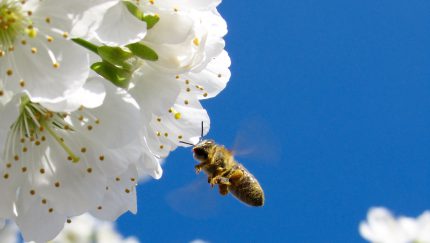Final report released for the Pollinator Health Action Plan
Posted: December 27, 2016
Categories: Food in the News / GoodFoodBites
 The Ministry of Agriculture, Food and Rural Affairs recently released the final report of the 2016 Pollinator Health Action Plan. The plan highlights government and stakeholder’s dedication to work towards improved pollinator health.
The Ministry of Agriculture, Food and Rural Affairs recently released the final report of the 2016 Pollinator Health Action Plan. The plan highlights government and stakeholder’s dedication to work towards improved pollinator health.
The plan outlines several action items that will help address the impacts that pollinators face. Here are some examples directly from the report. For the full report please visit the Ministry of Agriculture, Food and Rural Affairs website.
- Restore, enhance and protect one million acres of pollinator habitat in Ontario.
- Release and consult on a discussion paper on modernizing the legislative framework for beekeeping. Among other components, the modernization proposals could include provisions related to beekeeper training, updated requirements for the location of hives, recordkeeping and traceability, and modernized tools for pest and disease management.
- Launch a special research call ($1 million) to fund new research addressing key knowledge gaps related to pollinator health.
- Launch a digital awareness campaign to encourage Ontarians to plant pollinator-friendly gardens.
- Collect data from government monitoring and surveillance programs to establish baselines on the status of managed honey bees, wild pollinators and pesticide residues in the environment.
- Conduct climate change vulnerability assessments for select wild pollinator species.
- Compile and promote Best Management Practices (BMPs) that beekeepers should follow when wintering honey bee colonies, both outdoors and indoors, which can help optimize winter survival rates by managing colonies to ensure adequate health, strength and food stores.
- Continue education and outreach activities for farmers and other interested stakeholders on BMPs as they relate to Integrated Pest Management (IPM) to support the implementation of the neonicotinoid-treated seed regulation.
- Continue to work with farmers and other stakeholders through a suite of programs, such as the Great Lakes Agricultural Stewardship Initiative (GLASI), to support pollinators and habitat restoration and enhancement.
- Develop biosecurity-specific educational materials for greenhouse growers to help reduce pathogen spread from managed bumble bees to wild pollinators.
